ESST Student Society
ESST Students have a dynamic organization which meets regularly and provides a supportive culture through which to organize activities, facilitate professional opportunities and contribute to Acadia being a more sustainable campus. The Society organizes programs out of its own student lounge with an attached kitchen. Events across the year include conferences and workshops, a yearly banquet, and a range of social and sustainability activities.
As ESST is an interdisciplinary program, graduates go on to a wide variety of careers and opportunities. Here are some recent alumni profiles:
Alumni Profiles
Sofia Munoz
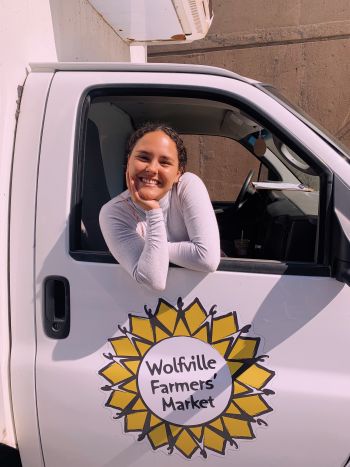
The ESST degree has so much to offer to students who are interested in making a meaningful change in the world! As a truly multidisciplinary degree, we are exposed to a diversity of interesting topics over the course of our degree, all of which help to inform a well-rounded understanding of the environment and sustainability in all of its complexities. The ESST program at Acadia is distinguished from other programs because of its exceptional experiential learning and out-of-the-classroom educational opportunities, and, most of all, the tight-knit community that students, staff, faculty, and alumni create. Completing my ESST degree at Acadia provided me with not only a multitude of opportunities to develop my academic prowess, professional skills, and personal interests, but also a community of friends, mentors, and peers who inspire and support my environmentalist work. Working in the world of sustainability can be challenging and frustrating; doing it alongside humans who are equally devoted, passionate, and engaged makes the work fun and keeps us going much longer! I am taking lots away from my time in the ESST program but also feel I’ve had the chance to give lots to it as well, and that is a very special thing.
These days, I am working as the community engagement coordinator at the Wolfville Farmers’ Market. In fact, I did all three of my Co-op placements at the WFM and it was central to inspiring the topic of my Honours Thesis, where I studied sustainable food systems transition in the post-secondary sphere. ESST at Acadia positioned me in a unique position where I can stand confidently at the intersection of academic, community, and student-driven initiatives, helping each grow and develop more strongly in collaboration with the others. I look forward to continuing to draw on the expertise, support, and love of my ESST community as an Acadia Alumni!
Ted Morris
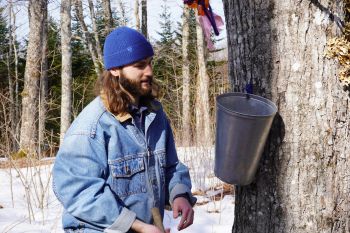
Hello! My name is Ted Morris and I graduated from Acadia in 2021 with a Bachelor's of Community Development with Environmental and Sustainability Studies. I aspire to be working in roles where I am either working hands on with the natural world or working with people to connect them to the natural world. The ESST program offered valuable development in that realm with emphasis on environmental education, environmental leadership, and on theoretical and strategic development practices. My knowledge and skills were harnessed both in and out of the classroom with projects that I have been able to reference post-grad in working positions, such as developing a campaign to provide awareness about the threatened Annapolis Valley Sand Barrens habitat or writing and presenting a report to the University's Board of Directors on strategies the institution can better align with the United Nations' Sustainable Development Goals.
Since graduating, I have been striving to advance my career with environmental NGOs and nonprofits. For the past year and a half I have been working for Ross Creek Centre for the Arts as their Environmental Manager. In this role, I manage the 175 acre landscape and 20 buildings on the property, as well as provide outdoor and environmental programming. The ESST program prepared me for this position through programming experience, project management, and fostering land stewardship practices. What I found valuable about the program was the flexibility to explore different academic areas of the university. I explored related topics such as ecological forestry and sustainable tourism, while also dipping my toes in business, nutrition, philosophy, and music. There are many ways to connect the environment and sustainability to other programs at Acadia, so there is lots of room to get creative with your education.
Emily Kennedy
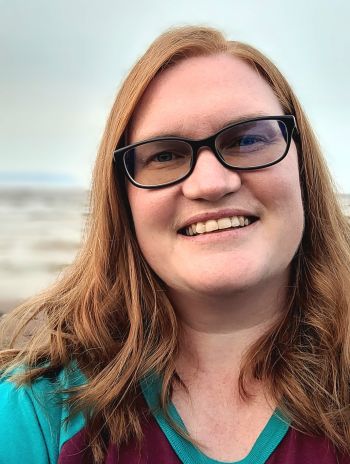
My ESST Degree has helped prepare me for almost every job I've held since graduating. The hands-on, experiential aspects of the ESST program always set me apart, because I had the theoretical knowledge, as well as the applied. Even in roles that weren't directly related to ESST, the transferable skills that come from this program are beneficial in a range of industries.
I've worked in parts of Africa and the UK, in the areas of food security and environmental justice. Since I have returned to Nova Scotia, I have worked in municipal government and as a lecturer at Acadia in the ESST program. I am currently coordinating the implementation of the Nova Scotia Electricity Sector Climate Adaptation Strategy, which I was a part of developing.
There are two things that stand out to me in the ESST Degree from Acadia. The first is the ability to take risks in a safe learning community. Prior to my time at Acadia I wasn't much of a risk taker. I lived comfortably in my little bubble. But the faculty and my classmates gave me the confidence and encouragement to explore concepts and ideas related to community engagement, business development, and so much more. Since graduating, I have moved to various parts of the world, and I've explored business ideas. I never would have done those things without the supportive community that came from the ESST program. And this leads me to my second point - the community you build. We don't always make the connection that the folks we spend a lot of our time with during our time at university will become some of the most valuable resources down the road. Make an effort to build connections with your fellow ESSTers (past and present), and you'll have an incredible community behind you once you graduate. I frequently call on faculty and classmates to help on projects I've been a part of since graduating.
Gill Cornier
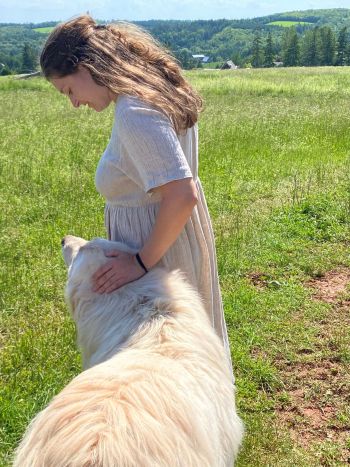
Since graduating from Community Development with Environmental Sustainability Studies in 2020, I started a farmers market (The Lupine Market) in my local community in Hampton, NB. The market focused on hosting vendors who knew the full cycle of their practices, who met a set of guidelines to be low-waste and as locally made as possible. Vendors were asked to know where their products came from, from start to finish and as much as possible, share details with the community. I ran this market from 2020-2022. That market has been passed off to the municipality as I’ve transitioned to working full-time for the National Farmers Union (NFU) and National Farmers Union in New Brunswick (NFU-NB) as a Communications Manager. My background in ESST gave a strong foundation to the work I did with the market, which eventually led to a connection to my existing job with the union. The professional and community skills I developed in the program as well as some of the systemic understandings of our environment helped me then with providing guidelines for the market that were grounded in "true sustainability", and helps me now communicate with accuracy in my role with the NFU.
As the climate crisis intensifies, it's becoming evident that we need more green jobs and people to work them and I believe that transition is possible. I am surprised that there are not more Environmental-Sustainability specific jobs out there, but on the other hand, I am encouraged to see a rise of opportunities within organizations/businesses which are seeking to have dedicated staff to work on sustainability efforts. I just hope these efforts are enough, and not simply a band-aid solution!
Alisha Christie
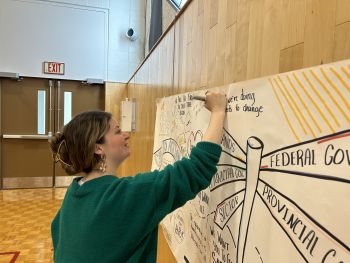
Since graduating from ESST and Community Development in 2019, I have spent most of my professional career working in the not-for-profit and government sectors. Currently, I work as the Housing and Community Partnerships coordinator for the Town of Kentville and coordinator of the work of the Homeless No More Initiative. My work in housing is deeply connected to sustainable community development and addressing the question - how might we build the most climate-resilient, affordable, safe and dignified communities in rural Nova Scotia. How we build and plan our communities shapes how we connect to and perceive nature as well as directly impacts climate preparedness and adaptability. ESST taught me to look at the interconnections between built and natural environments and how to challenge the status quo, particularly in government, when building and retrofitting new and existing communities.
George Philp
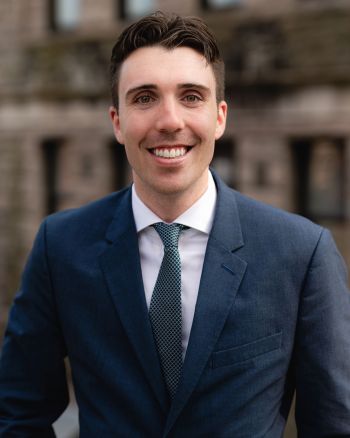
The most valuable thing about my ESST Degree was the people! The value of a university degree is not derived from the name of the university you attend, but from the relationships you foster throughout your studies. In ESST I had the opportunity to work with and get to know many of my classmates, professors, and university staff—all of whom made for an incredible learning experience and amazing mentorship opportunities. I am so grateful for the opportunities ESST provided me, from research to working on public service initiatives, the students and faculty in the program made my undergraduate experience incredibly formative.
I think the most important thing ESST instills in its students is the virtue of active citizenry. The program doesn't merely teach you to recognize the environmental and social issues in your community, province, and country, but encourages students to do something about said issues. ESST helps students develop the skills to "be comfortable being uncomfortable" and embrace challenges they see outside their window head on. Along the way students develop some important skills—public speaking, writing and communication, leadership, advocacy, and more—that set you up for success no matter what career graduates inevitably pursue.
Lindsay Leckie
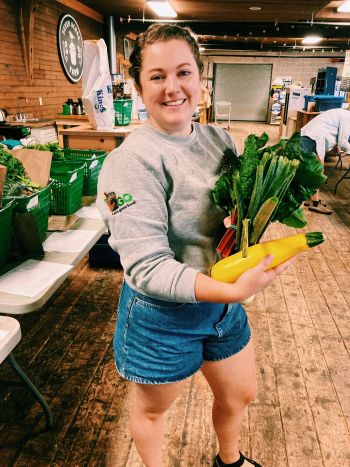
I have been working for the Wolfville Farmers' Market (WFM) since May 2017. I was hired to launch and manage its online ordering and delivery service, WFM2Go. This past year (2023) I moved roles and I am now the Business Development Manager. I graduated from Acadia in the ESST program and went on to do my Masters at Dalhousie in Environmental Studies, where I did my thesis research on agricultural policy.
I really appreciate that the ESST program allowed me the flexibility to learn about both sustainability, the environment, and business. These learnings helped me grow the skills needed to work for a non-profit and run a business that supports farmers and local businesses (WFM2Go). Now, as the Business Development Manager, I am applying these skills to the several services offered by the Wolfville Farmers' Market: the in-person market, online store, wholesale distribution, and now a new experiential tourism service.
I really love my job. I get to work with people who care about the land, and implement biodiversity and sustainability in the values of their businesses. I get to use the knowledge gained during my time in the ESST program and apply it everyday, in a way that truly makes a difference here in Nova Scotia. Finding a career that aligns with my personal values has had such a positive impact on my life. I now have a 1 year old daughter, and I am proud that I get to show her that you can have a job that also makes a difference and that you care about. Pretty awesome!
Bonnie Lewtas

Going into university, I was always interested in sustainability, sustainable tourism, and sustainable coastal management and islands. ESST was the first time where we were encouraged to look at projects not only from the front at face-value but also behind the scenes, asking questions and interviewing different stakeholders to really see what’s going on. And that's exactly what I do now in my career as well; I will go to an island and look at the nice hotels, restaurants, and bars, but then get in contact with the owners to ask about what’s happening in the background: where do you get your food from? How does your sewage system work? Where does your waste go? Etc.
I really love how ESST combines field work with writing and reading research so that you’re able to analyze different papers and look at them from critical viewpoints, but also go on field trips into the forest, connect with nature, and meet different communities. Another really special thing about the program was the connections that we had with our professors. I remember going to potluck dinners with my cohort and professors, hanging out at the ESST house on campus where we could host bonfires and make dinners together. As ESST students we were, of course, part of the regular Acadia community, but we always kind of had our own weird special thing going on.
